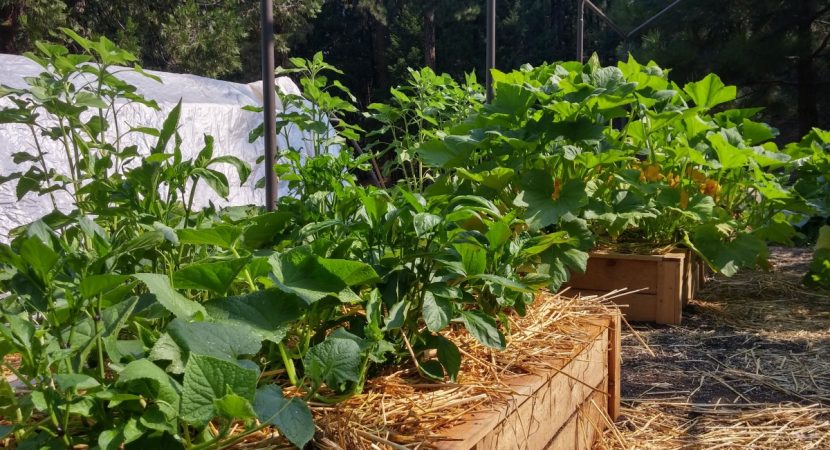Last Updated on
With the plethora of low quality food flooding the market, people are becoming more and more aware of what they eat. Since it directly affects their health, consumers try to avoid unhealthy products. That’s the reason for an increasing number of gardens producing organic fruits and vegetables. How does organic gardening differ from conventional? The main difference concerns the usage of synthetic pesticides and fertilisers, which are allowed in conventional gardening, whereas they aren’t approved on the organic plantation.
However, the organic gardening requires many different methods to incorporate on a daily basis. The crucial thing is to start using natural pesticides, which may be more time-consuming, but worthy in the long run. Another question is water, enriched by organic compounds, which provides the soil with the elements essential for the healthy growth of garden plants. The backyard fish pond is the best source of this type of water. The other essential element that every organic gardener should remember about is supporting particular organisms which benefit the crops.
Making a natural compost
First and foremost, organic gardening should be started with making a natural compost. It’s a dark and crumbly organic substance made from leaves, grass clippings and kitchen waste. However, even finished may contain small bits of twigs and leaves as it’s never completely decomposed like hummus.
Compost serves as a soil conditioner, but only when it’s finished. Otherwise, some microorganisms may deprive plants of many essential nutrients. It’s commonly used in many gardens to improve the health and structure of both sandy and clay soils. This additive is ideal, especially for Florida’s sandy soils.
To make such a compost, you need two kinds of materials: “green” and “brown”. The former are generally all types of twigs, branches, and leaves. The latter consists mainly of natural manure but coming only from herbivores, such as cows or horses. Carnivorous animal waste isn’t recommended because of the occurrence of potential diseases.
Using organic fertilizers
As was mentioned above, the best organic fertilizer for plants is both animal and plant manure. It’s rich in such chemical elements as nitrogen, potassium, and other supplements. That’s why it perfectly enriches the soil.
Of course, you can also buy some already available organic fertilizers, but you should choose them considering the type of soil, its previous treatment, and the types of crops you cultivate. If there’s a wide variety of plants in your garden, all of them may need different fertilizers. However, under no circumstances should you use lawn fertilizers since they have too many herbicides and the wrong concentrations of nutrients for vegetables.
Isolation and watering plants
Except for your contribution to the organic cultivation, natural conditions are vital. One of them is isolation. Most plants require a lot of sun and heat, needed to photosynthesis. It would be ideal if they were exposed to sunlight for 8 hours a day. However, if it’s impossible, it’s good to provide them with as much sun as you can.
Another crucial and environmentally-friendly method is sufficient watering. As obvious as it may seem, garden plants need a lot of water to produce a healthy crop. But what type of water is the best for your garden? The best water is this rich in organic components, found for example, in the pond. Of course, you have such water only if the pond is properly aerated, and that’s possible thanks to specific equipment. To find more about it, you can visit specific websites like Living Water Aeration, for example.
Moreover, it’s important to water plants as close to the roots as you can, and never do that in the middle of the day since it may quickly evaporate. That’s why the perfect time for watering your plants is the late afternoon or the evening.
Beneficial Organisms
Starting your organic garden, you should also take into account different organisms living in the soil, which can be beneficial for the whole cultivation. What are they? These are, primarily, bacteria, fungi, different types of worms and arthropods Apart from them, your plants may take advantage of other species such as bees, spiders, butterflies, or birds. Their main benefits include pest control, pollination, and spreading seeds through faeces in the case of birds.
Unfortunately, not all creatures are useful from a gardener’s point of view. The pests, have a detrimental effect on the growing process. Therefore, to resist them within organic gardening, you should use some natural products for managing garden pests, for example different types of oils, insecticidal soaps, plant extracts or microbial insecticides.
To sum up, you can see that organic gardening is quite beneficial in terms of producing healthy fruits and vegetables. However, it’s also pretty demanding and requires a lot of knowledge before taking up this activity. Thus, it’s always good to do some research beforehand to know how to appropriately take care of your organic plants.


Reply